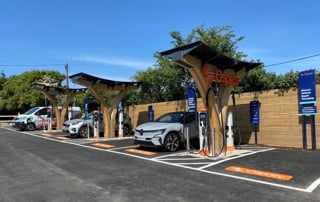A planned ban on the sale of new diesel and petrol cars and vans, as well as hybrids, could start as early as 2032, the transport secretary Grant Shapps has said.
The Prime Minister Boris Johnson announced last week that he wanted to bring the ban forward from 2040 to 2035.
Now, Shapps has told the BBC that it could be introduced from 2032, subject to a consultation.
A Department for Transport (DfT) spokesman explained: "We are consulting on a range of possible dates to bring forward the end to the sale of petrol and diesel cars and vans.
"The consultation proposal for this is 2035 - or earlier if a faster transition appears feasible - as well as including hybrids for the first time."
Matthew Walters, head of consultancy and customer data services at LeasePlan UK, told Fleet News that the vehicle leasing company "fully support plans for the UK to hit zero-emission targets as soon as possible".
However, he said: "It is also key to clarify exactly how the Government is going to help both the industry and consumers to meet a 2032 deadline.
"Whilst some updates are expected in the budget, we need clarity on the actions it’s looking to implement, rather than just a focus on the targets themselves.
"There is a clear need for increased support for manufacturers to ensure that supply meets demand, especially in the wake of Brexit.
"The Government also needs to clarify its position on the grants available aimed at increasing EV uptake for consumers and businesses.
"Ultimately, it has support from businesses to achieve these targets, but we need a strong actionable approach to ensure we get there, in tandem, as soon as possible.”
Edmund King, AA president, added: “A week may be a long time in politics but potentially shifting the ban three years earlier does not give a long time for manufactures, infrastructure providers, lease companies and indeed drivers to gear up for the green revolution.
“We know drivers support measures to clean up air quality and reduce CO2 emissions but these already stretched targets, potentially being stretched further, might be considered mission impossible.”
King says that consumers and industry need a longer-term package of grants coupled with a comprehensive charging infrastructure.
He continued: “The AA has suggested cutting VAT on new EVs to boost sales and make vehicles more affordable to those on lower incomes.
“We still believe including state of the art plug-in hybrids in the ban when manufacturers are also spending billions on developing these vehicles, which are zero emissions for many journeys, is really short-sighted.
“Ironically, demonising hybrids, like diesels, could mean some drivers choose not to buy a hybrid in the interim but hang onto their older more polluting vehicles for longer.”
Speaking before Shapps indicated that the ban could be brought forward to 2032, Caroline Sandall, chairman of fleet representative body ACFO, said: “Climate change and air quality are major international concerns, but simply advocating a ban on the sale of petrol, diesel and hybrid cars and vans is far too simplistic.
“It is clear politicians do not live in the real world - a world occupied by businesses employing fleet decision-makers that already typically operate the most technologically advanced and therefore the cleanest vehicles available.
“Fleets are, in the main, in the vanguard of introducing plug-in vehicles and taking action to reduce their carbon footprint, but politicians must make it much easier to switch, and switch quickly.”






















Login to comment
Comments
No comments have been made yet.